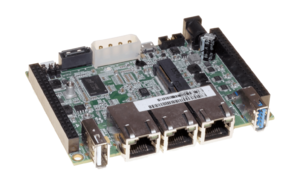Difference between revisions of "Globalscale ESPRESSObin v5"
Stephen304 (talk | contribs) (→Files) |
|||
| (10 intermediate revisions by 3 users not shown) | |||
| Line 1: | Line 1: | ||
| + | [[Category:Devices]] | ||
[[Category:Globalscale]] | [[Category:Globalscale]] | ||
[[File:Espressobin_v5.png|thumb|ESPRESSObin v5]] | [[File:Espressobin_v5.png|thumb|ESPRESSObin v5]] | ||
The ESPRESSObin v5 is a small single board computer similar to a raspberry pi. It has 3 ethernet ports, a USB 3.0 port, as well as an internal mPCIe slot. | The ESPRESSObin v5 is a small single board computer similar to a raspberry pi. It has 3 ethernet ports, a USB 3.0 port, as well as an internal mPCIe slot. | ||
| + | |||
| + | '''NOTE:''' Unfortunately, we found the ESPRESSObin v5 was too slow for Yggdrasil and it has tricky bootloader settings that make it difficult to setup. We do not recommend it at this time. | ||
== Files == | == Files == | ||
| − | [https:// | + | [https://downloads.massmesh.net/snapshots/images/meshnode/globalscale_espressobin/openwrt-21.02.1-massmesh-meshnode-mvebu-cortexa53-globalscale_espressobin-squashfs-sdcard.img.gz MassMesh MeshNode Firmware (Latest)] |
[https://downloads.openwrt.org/releases/18.06.2/targets/mvebu/cortexa53/openwrt-18.06.2-mvebu-cortexa53-globalscale-espressobin-squashfs-sdcard.img.gz OpenWrt Stable 18.06.2 Image] | [https://downloads.openwrt.org/releases/18.06.2/targets/mvebu/cortexa53/openwrt-18.06.2-mvebu-cortexa53-globalscale-espressobin-squashfs-sdcard.img.gz OpenWrt Stable 18.06.2 Image] | ||
| Line 12: | Line 15: | ||
[https://downloads.openwrt.org/snapshots/packages/aarch64_cortex-a53/packages/yggdrasil_0.3.5-4_aarch64_cortex-a53.ipk Yggdrasil 0.5.3 Package] | [https://downloads.openwrt.org/snapshots/packages/aarch64_cortex-a53/packages/yggdrasil_0.3.5-4_aarch64_cortex-a53.ipk Yggdrasil 0.5.3 Package] | ||
| + | |||
| + | [https://www.thingiverse.com/thing:2374908 STL file for 3D printed case] | ||
== Build The Image == | == Build The Image == | ||
| − | + | Use profile <code>meshnode</code> and device <code>globalscale_espressobin</code> and see [[Building the Firmware]] for instructions on using the ImageBuilder. | |
| − | |||
| − | < | ||
| − | |||
| − | |||
| − | |||
| − | |||
| − | |||
| − | |||
| − | |||
| − | |||
| − | |||
| − | |||
| − | |||
| − | |||
| − | |||
| − | |||
| − | |||
| − | |||
| − | |||
| − | |||
| − | |||
| − | |||
| − | |||
| − | |||
| − | |||
| − | |||
== Modify U-Boot Variables == | == Modify U-Boot Variables == | ||
| Line 58: | Line 37: | ||
== Flashing == | == Flashing == | ||
| − | + | The Espressobin uses a removable microSD card for storage, which makes it easy to load custom firmware onto it. Build or download a firmware from the Files section of this page and acquire a microSD card at least 2GB in size. Then refer to the [[Flashing Removable Media]] page to learn how to write the firmware to the card. | |
| − | + | ||
| − | + | When this has been completed, you will be able to insert the microSD card into the ESPRESSObin and connect it to power. It should boot into the custom firmware. | |
| − | |||
| − | |||
| − | |||
Latest revision as of 14:19, 6 February 2022
The ESPRESSObin v5 is a small single board computer similar to a raspberry pi. It has 3 ethernet ports, a USB 3.0 port, as well as an internal mPCIe slot.
NOTE: Unfortunately, we found the ESPRESSObin v5 was too slow for Yggdrasil and it has tricky bootloader settings that make it difficult to setup. We do not recommend it at this time.
Files
MassMesh MeshNode Firmware (Latest)
Build The Image
Use profile meshnode and device globalscale_espressobin and see Building the Firmware for instructions on using the ImageBuilder.
Modify U-Boot Variables
Before the ESPRESSObin will boot our Open WRT image from an SD card, we will need to modify just a few U-Boot variables. More information about this can be found in this commit message and these docs.
In order to connect to your modify ESPRESSObin's U-Boot variables, you'll need to establish a serial connection.
Once you've established a serial connection, change the bootcmd variable using the following command:
setenv bootcmd 'mmc dev 0; ext4load mmc 0:1 $kernel_addr $image_name;ext4load mmc 0:1 $fdt_addr $fdt_name;setenv bootargs $console root=/dev/mmcblk0p1 rw rootwait; booti $kernel_addr - $fdt_addr'
Now, save your changes.
saveenv
Flashing
The Espressobin uses a removable microSD card for storage, which makes it easy to load custom firmware onto it. Build or download a firmware from the Files section of this page and acquire a microSD card at least 2GB in size. Then refer to the Flashing Removable Media page to learn how to write the firmware to the card.
When this has been completed, you will be able to insert the microSD card into the ESPRESSObin and connect it to power. It should boot into the custom firmware.
